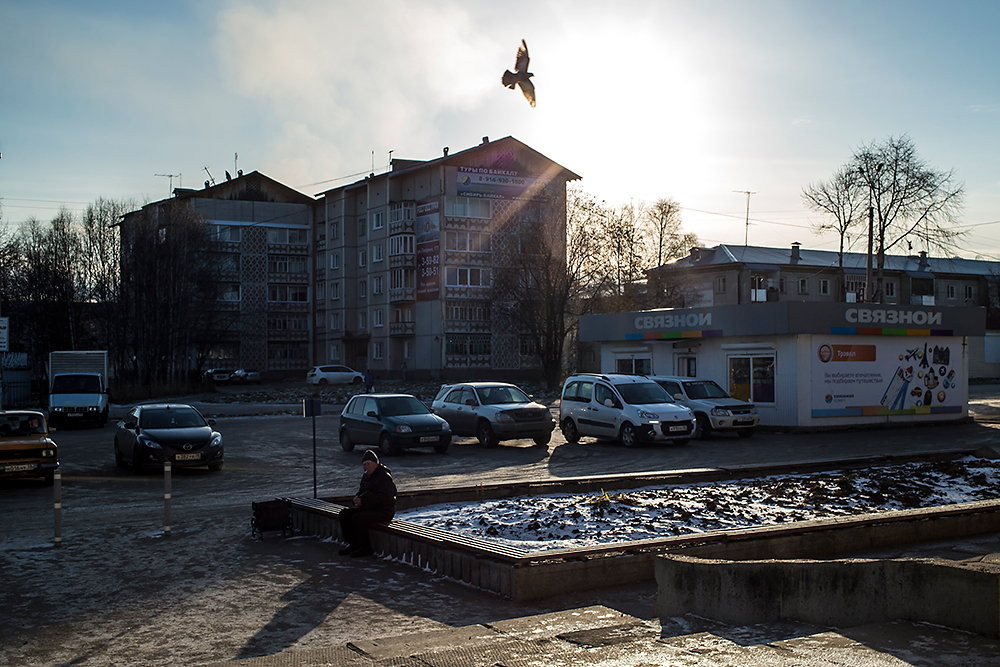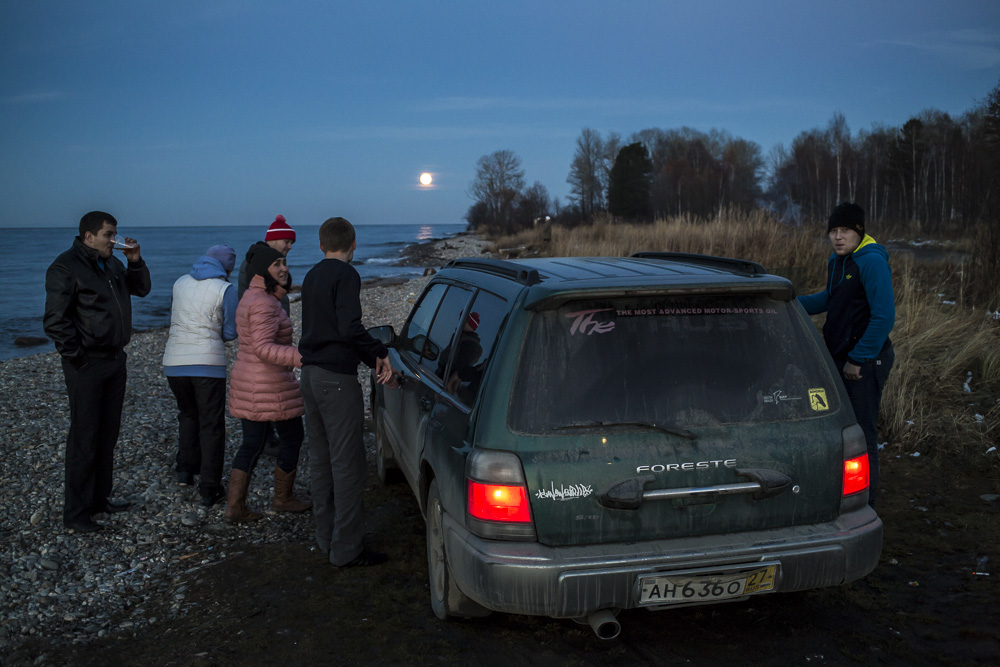
BAIKALSK, Russia — During my journey I woke up twice. Once I looked out the window to see a group of men examining two crashed cars next to a gigantic bump on the road. The next time I awoke to see the huge blue eye of Lake Baikal, the world's biggest lake, staring at me through thin, naked tree branches; a range of snow-topped mountains hugged the lake's banks. The breathtaking scenery kept me awake for the rest of the trip even after the sleepless night I'd spent on the plane from Moscow. In a recent survey, a majority of Russians said that Lake Baikal should be the symbol of Russia. Not Red Square, not even the Kremlin, but the deep, dark blue heart of Siberia.
My destination was Baikalsk. It's a sleepy town with a population of about 15,000 people. Until recently it was a place that found itself squarely at the center of not always welcome attention from the world's environmentalists. Baikalsk is one of about 400 Soviet "monotowns," communities whose existence depended on a single industry or factory. Baikalsk was originally founded in 1961 to support the town's single industry, Baikalsk Pulp and Paper Mill. For decades, the mill dumped tons of pollutants into the air and soil and the water of the lake and its environment. Indeed, its assault on the unique Baikal environment so inflamed local people that they began one of the first ecological protest campaigns in the history of the Soviet Union. Over the past decade the Kremlin has struggled to resolve the issue: President Vladimir Putin, Vice Prime Minister Igor Shuvalov, and Prime Minister Dmitry Medvedev have all, at various times, flown over to decide the fate of the tiny town. The officials said powerful words about Baikalsk's future and gave the mill's employees big promises of alternative livelihoods. But when the mill finally shut down last month, no alternatives were apparent. The city sank into depression.
We drove a few more miles along the shore of the world's clearest, deepest, and oldest lake. Gradually the bumpy road smoothed out. I recognized the two- and three-story gray brick buildings on Gagarin Street, the fading facade of the town's main store, my sad-looking hotel, and a concrete Soviet restaurant on the main square. Our bus came to a stop. A woman pushed a carriage with a little boy towards a kiosk selling cell phones across the square. A group of men smoked cigarettes in the freezing air without saying much, just spitting on the stained asphalt.
At the first glance, Baikalsk looked more dead than when I had visited during the town's first big crises in 2008. That year, the mill fired about 1,300 workers, both men and women. Some of them threatened to lie down on Tran-Siberian railroad in order to draw Moscow's attention to their plight; others went on a hunger strike, setting up camp in tents on the town's central square and demanding compensation for their ruined lives. Dozens wrote letters to Putin about their personal bitterness and the collapsing infrastructure. After all, the entire life of Baikalsk -- the kindergartens, the schools, central heating and electricity -- depended on the pulp mill.
The mill stayed closed for two years, then reopened in 2010, to the horror of environmentalists, and went right back to dumping industrial waste into the fields and forests around the town. The smell of rotten cabbage returned as the mill's smokestacks went back to belching methanethiol into the atmosphere. The workers, though, were happy: once again they had jobs. Until this summer, at least. That's Prime Minister Medvedvev drew a line during a visit to the region: "There is no way back," he said. "It's time to muster up the courage and make responsible decisions."
Medvedev promised to boost tourism and make a paradise in Baikalsk by investing $1 billion in projects to benefit the environment and the further development of the town, starting by the end of the summer. Summer passed, and the mill closed its doors to hundreds of workers. But Baikalsk has yet to see the envisioned swarms of tourists rushing in to the rescue.
The drama evolved right behind the curtain. In a little café on the main square, local women told me their family stories: their unemployed men had set off to look for jobs in the far North, at oil and gas fields, or at construction sites. They left their families behind for weeks at a time; some of them never came back. "Our families fall apart," Irina Maksimova, a waitress, told me. "What were they thinking when they decided to end the era of industrialization in our town, where three generations have had stable jobs at the mill?" Maksimova made about $200 a month; as we spoke her husband had already been away from her and their two children for over 28 days.
"Ah, come on," Vasiliy Temgenevsky, the mayor of Baikalsk, told me. "It's a woman's own fault if her husband leaves her. It doesn't depend on long-term shifts or employment. Men leave women if they're unhappy." The mayor told me that he was currently negotiating with a Chinese company to build a factory for the production of low-energy lamps. "We're going to employ about 800 people," Temgenevsky said. "But the Chinese investors want 60 percent of them to be women." At least someone in Baikalks may get jobs soon.
So what will happen to the hundreds of other people that have been fired? I decided to ask Alexander Ivanov, the manager assigned to shut down the old mill by a Moscow-based company entrusted with the task by the Kremlin. "It was probably wrong to shut down the mill before creating new jobs for people, " Ivanov admitted. "But we're paying the required compensations of five months' salary to all of the fired workers." So far Ivanov has fired 330 of them. 470 more employees will lose their jobs by Christmas.
In the mornings, local people come for a walk on the beach to see Lake Baikal "boiling" in the first rays of the sun, when clouds of steam rise from round stones that have become covered with thin layer of ice during the night. There's only one monument in the town: a statue of a strawberry. Picking and selling strawberries in early summer has been the only stable income for many local people over the years. "We've heard so many lies from officials that we don't believe in anything any more except for own hands," Yuri Nabokov, the head of the mill's professional union, told me. "Not a single letter we wrote to Putin about the situation here has ever received a response."
On my last day, when I went down to the shore to say goodbye to the lake, I saw a woman staring at the water. "Put your hand into the water and make your wish," she told me. "Baikal remembers and keeps its promises." At least the lake does.







